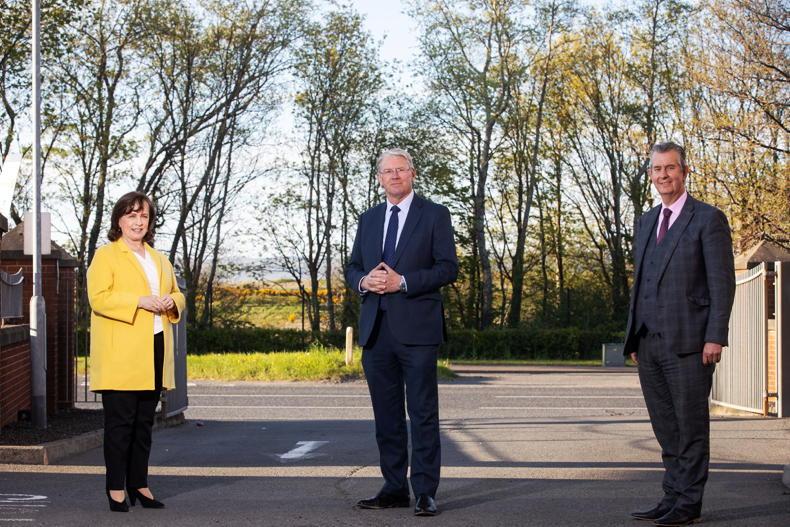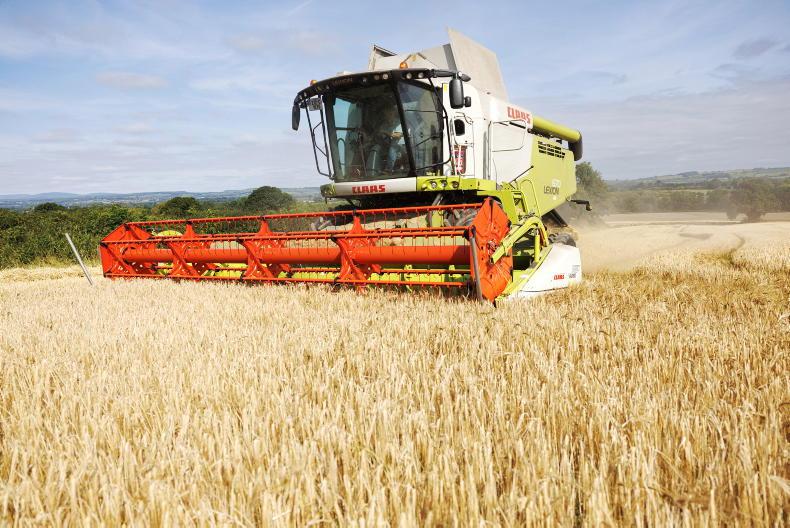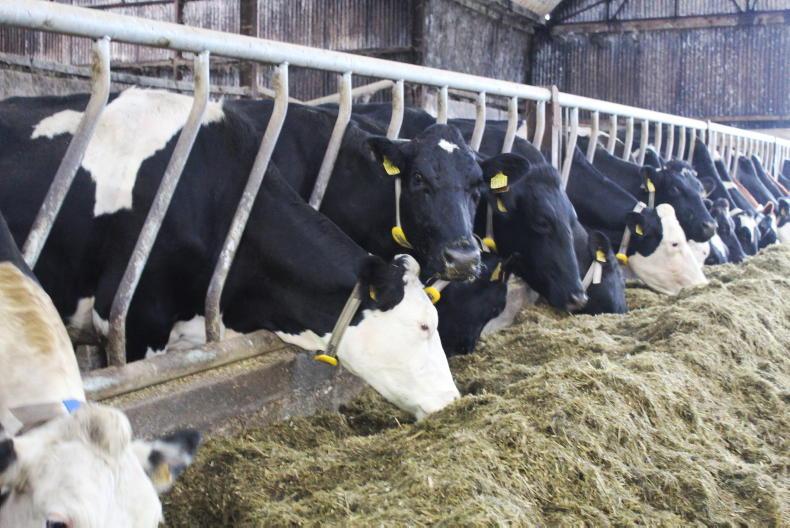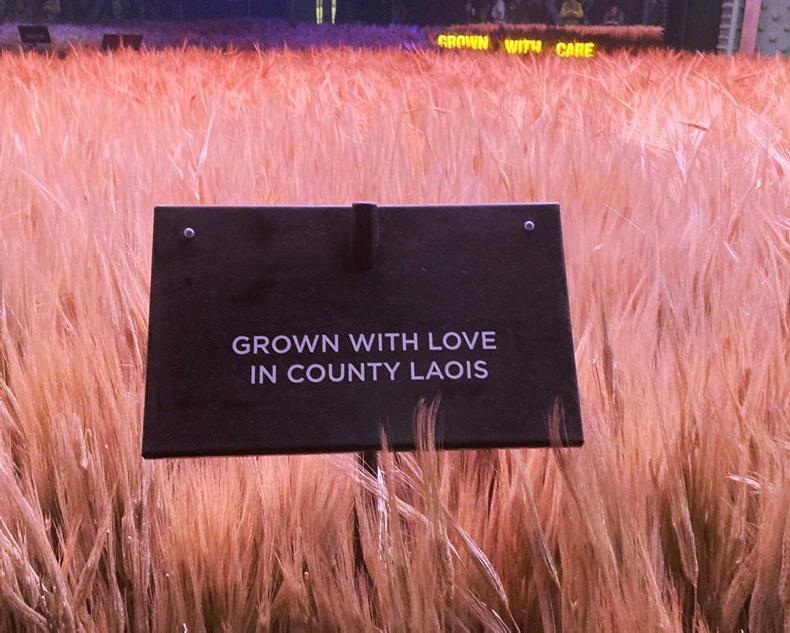Organisations such as the Livestock and Meat Commission (LMC), AgriSearch, Animal Health and Welfare NI (AHWNI), and a new livestock genetics body should all be absorbed into a combined structure, a high-level report has recommended.
The report was written by a team led by former National Farmers’ Union president Sir Peter Kendall, after the group were commissioned by DAERA Minister Edwin Poots and former Economy Minister Diane Dodds to undertake an independent strategic review of the NI agri-food sector.
Kendall’s team “strongly support” the idea of bringing various organisations into a new sustainability body, and recommend that proposals are put to relevant ministers in the coming weeks.
Proposed membership would include farmers and processors, it would be run by a board, and among its functions would be the collection and analysis of data around environmental performance on farms.
Having information on environmental performance is also seen as key to future marketing activity for NI agri-food
The main driver for the new body is a recognition that there is a lot of work happening across the industry around sustainability, but much of it is uncoordinated.
Having information on environmental performance is also seen as key to future marketing activity for NI agri-food.
However, the Kendall review makes it clear that NI has a long way to go around environmental performance, highlighting that the current situation makes for “grim reading”, and there is not a positive story to be told at present.
“The environment has paid the price for what, on one level, is the impressive success of NI agri-food in growing its livestock sector over the last 40 years and making the most of a climate that favours grass production,” states the document.
To accelerate change, the report recommends that collection and recording of data on farms (to support a new sustainability body) should be a “condition of financial support of any kind”.
Processor grants
Among the other recommendations put forward by Kendall is that the Department for the Economy should move swiftly to open a grant scheme for large-scale processors, as has happened in the Republic of Ireland and other parts of the UK.
The report warns that processors could relocate out of NI if the situation is not addressed, and points out that there is a need to invest in the sector to help deliver environmental objectives, and also more automation given current issues around recruiting staff.
Diamond
However, the core recommendation from Kendall is not a sustainability body or processor grants, but a new overall structure based around a so-called NI Diamond.
In the report, Kendall claims to have been “inspired” by a proposal developed by Queen’s University Belfast (QUB) and the Agri-Food and Biosciences Institute (AFBI), which is modelled on a “Dutch Diamond” approach.
The principle involves four different groupings (government; education and research; farmers and processors; and green groups) coming together to agree programmes of work and funding to tackle issues such as how NI will meet future targets for so-called ‘green growth’.
According to the report, the concept has the potential “to inspire farmers, processors and other agri-food businesses”. The Kendall-led team want to see fully costed proposals for a pilot stage presented by spring 2022 at the latest.
Read more
NI agri-food keen on sustainability body
Eustice supports NI farm payment plan
Organisations such as the Livestock and Meat Commission (LMC), AgriSearch, Animal Health and Welfare NI (AHWNI), and a new livestock genetics body should all be absorbed into a combined structure, a high-level report has recommended.
The report was written by a team led by former National Farmers’ Union president Sir Peter Kendall, after the group were commissioned by DAERA Minister Edwin Poots and former Economy Minister Diane Dodds to undertake an independent strategic review of the NI agri-food sector.
Kendall’s team “strongly support” the idea of bringing various organisations into a new sustainability body, and recommend that proposals are put to relevant ministers in the coming weeks.
Proposed membership would include farmers and processors, it would be run by a board, and among its functions would be the collection and analysis of data around environmental performance on farms.
Having information on environmental performance is also seen as key to future marketing activity for NI agri-food
The main driver for the new body is a recognition that there is a lot of work happening across the industry around sustainability, but much of it is uncoordinated.
Having information on environmental performance is also seen as key to future marketing activity for NI agri-food.
However, the Kendall review makes it clear that NI has a long way to go around environmental performance, highlighting that the current situation makes for “grim reading”, and there is not a positive story to be told at present.
“The environment has paid the price for what, on one level, is the impressive success of NI agri-food in growing its livestock sector over the last 40 years and making the most of a climate that favours grass production,” states the document.
To accelerate change, the report recommends that collection and recording of data on farms (to support a new sustainability body) should be a “condition of financial support of any kind”.
Processor grants
Among the other recommendations put forward by Kendall is that the Department for the Economy should move swiftly to open a grant scheme for large-scale processors, as has happened in the Republic of Ireland and other parts of the UK.
The report warns that processors could relocate out of NI if the situation is not addressed, and points out that there is a need to invest in the sector to help deliver environmental objectives, and also more automation given current issues around recruiting staff.
Diamond
However, the core recommendation from Kendall is not a sustainability body or processor grants, but a new overall structure based around a so-called NI Diamond.
In the report, Kendall claims to have been “inspired” by a proposal developed by Queen’s University Belfast (QUB) and the Agri-Food and Biosciences Institute (AFBI), which is modelled on a “Dutch Diamond” approach.
The principle involves four different groupings (government; education and research; farmers and processors; and green groups) coming together to agree programmes of work and funding to tackle issues such as how NI will meet future targets for so-called ‘green growth’.
According to the report, the concept has the potential “to inspire farmers, processors and other agri-food businesses”. The Kendall-led team want to see fully costed proposals for a pilot stage presented by spring 2022 at the latest.
Read more
NI agri-food keen on sustainability body
Eustice supports NI farm payment plan









SHARING OPTIONS